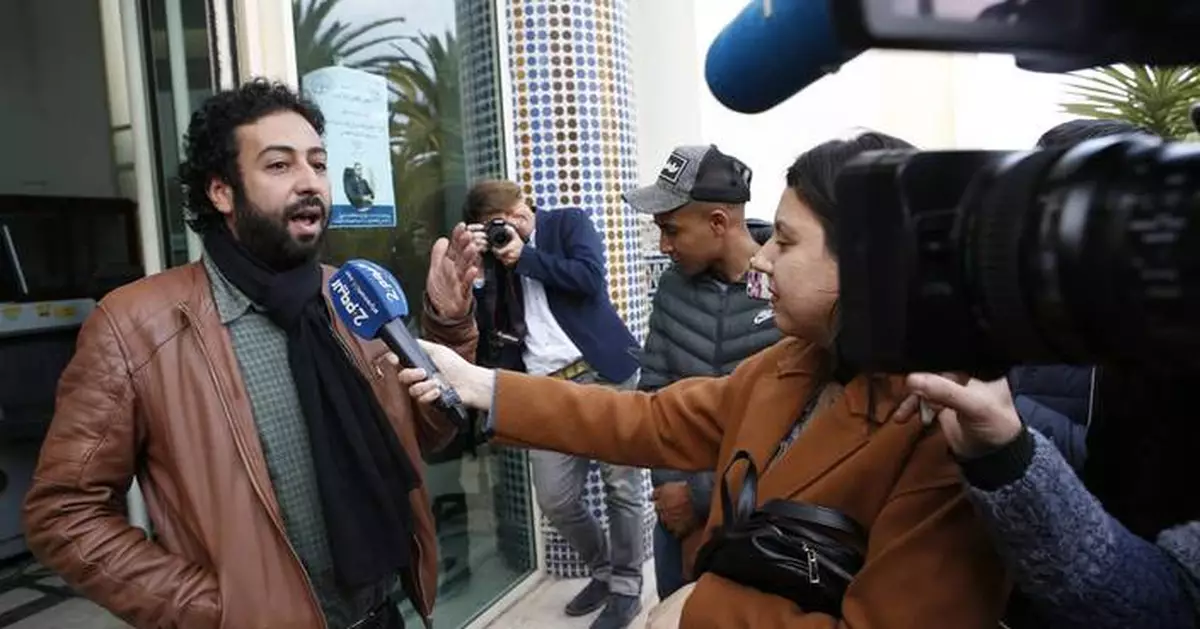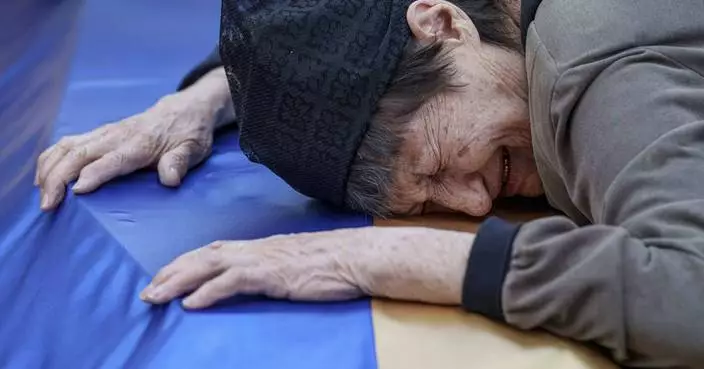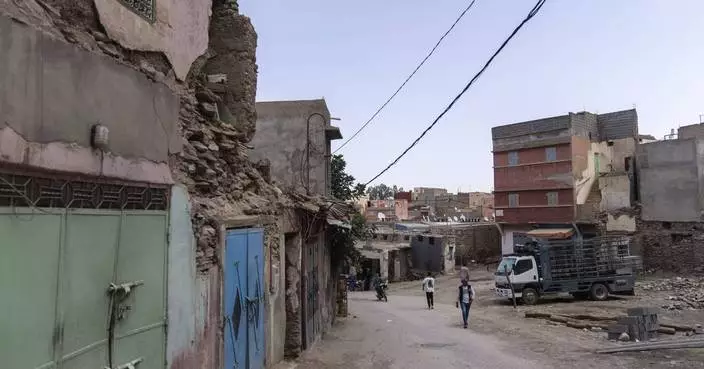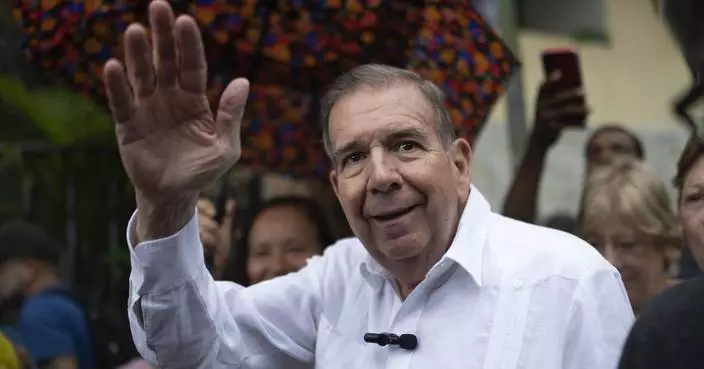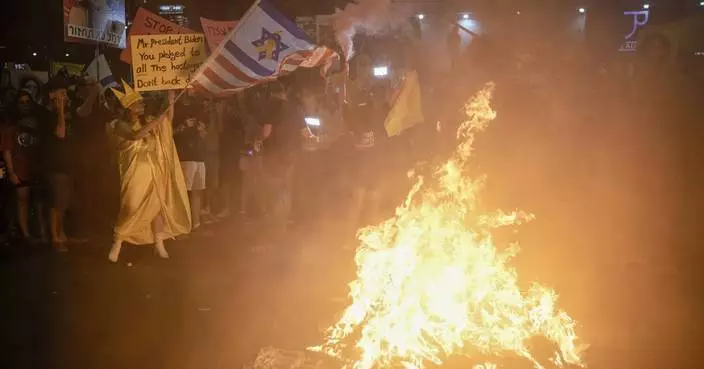RABAT, Morocco (AP) — Three journalists who were sentenced to years in prison after writing about corruption and abuse of power in Morocco were released Monday after receiving pardons from King Mohammed VI.
Omar Radi, Taoufik Bouachrine and Soulaimane Raissouni were among 2,278 people pardoned this week, according to Morocco’s Ministry of Justice. The pardons were announced as Morocco prepared to celebrate its national holiday marking the 25th anniversary of when Mohammed VI ascended to the throne.
Click to Gallery
FILE - People carry banners and chant slogans during a protest calling for the release of detained journalists Omar Radi and Soulaimane Raissouni, in downtown Rabat, Morocco, Tuesday, May 25, 2021. Morocco’s King Mohammed VI on Monday, July 29, 2024, pardoned three journalists, including Radi and Raissouni, who were charged with sex crimes and espionage in prosecutions widely condemned by press freedom advocates as retaliatory in response to critical reporting. (AP Photo/Mosa'ab Elshamy, File)
FILE - Journalist and activist Omar Radi speaks to the media after his hearing at the Casablanca Courthouse, In Casablanca, Morocco, Thursday March 5, 2020. Morocco’s King Mohammed VI on Monday, July 29, 2024, pardoned three journalists, including Radi, who were charged with sex crimes and espionage in prosecutions widely condemned by press freedom advocates as retaliatory in response to critical reporting. (AP Photo/Abdeljalil Bounhar, File)
RABAT, Morocco (AP) — Three journalists who were sentenced to years in prison after writing about corruption and abuse of power in Morocco were released Monday after receiving pardons from King Mohammed VI.
Omar Radi, a journalist and activist, left, is embraced by a family member after he was released from prison in Tifelt, Morocco, Monday, July 29, 2024. Morocco's King Mohammed VI on Monday pardoned a group of journalists who were charged with sex crimes and espionage in prosecutions widely condemned by press freedom advocates as retaliatory in response to critical reporting. (AP Photo)
Omar Radi, a journalist and activist, speaks on the phone after he was pardoned and released from prison in Tifelt, Morocco, Monday, July 29, 2024. Morocco's King Mohammed VI on Monday pardoned a group of journalists who were charged with sex crimes and espionage in prosecutions widely condemned by press freedom advocates as retaliatory in response to critical reporting. (AP Photo)
Omar Radi, a journalist and activist, right, is embraced by family members after he was released from prison in Tifelt, Morocco, Monday, July 29, 2024. Morocco's King Mohammed VI on Monday pardoned a group of journalists who were charged with sex crimes and espionage in prosecutions widely condemned by press freedom advocates as retaliatory in response to critical reporting. (AP Photo)
Omar Radi, a Journalist and an activist, left, with family members after he was pardoned and released from prison in Tifelt, Morocco, Monday, July. 29, 2024. Morocco's King Mohammed VI on Monday pardoned a group of journalists who were charged with sex crimes and espionage in prosecutions widely condemned by press freedom advocates as retaliatory in response to critical reporting. (AP Photo)
Omar Radi, a Journalist and activist is embraced by family member moment he was released from prison in Tifelt, Morocco, Monday, July. 29, 2024. Morocco's King Mohammed VI on Monday pardoned a group of journalists who were charged with sex crimes and espionage in prosecutions widely condemned by press freedom advocates as retaliatory in response to critical reporting. (AP Photo)
FILE - People carry banners and chant slogans during a protest calling for the release of detained journalists Omar Radi and Soulaimane Raissouni, in downtown Rabat, Morocco, Tuesday, May 25, 2021. Morocco’s King Mohammed VI on Monday, July 29, 2024, pardoned three journalists, including Radi and Raissouni, who were charged with sex crimes and espionage in prosecutions widely condemned by press freedom advocates as retaliatory in response to critical reporting. (AP Photo/Mosa'ab Elshamy, File)
FILE - Journalist and activist Omar Radi speaks to the media after his hearing at the Casablanca Courthouse, In Casablanca, Morocco, Thursday March 5, 2020. Morocco’s King Mohammed VI on Monday, July 29, 2024, pardoned three journalists, including Radi, who were charged with sex crimes and espionage in prosecutions widely condemned by press freedom advocates as retaliatory in response to critical reporting. (AP Photo/Abdeljalil Bounhar, File)
Moroccan law affords the king, as head of state, the power to grant such pardons, which apply to the journalists' prison sentences but not to the civil penalties or the money that courts ordered them to pay their accusers.
The journalists were freed from prison in Tifelt, a town east of Rabat, to a group of ecstatic supporters.
Human rights activists applauded the pardons, but said the move didn't exonerate what they have called the politically motivated manner in which Moroccan authorities pursued and prosecuted the journalists.
“Congratulations. Awaiting the others — and democracy,” human rights activist Fouad Abdelmoumni wrote on Facebook, referencing that a number of dissidents remained behind bars in the North African kingdom.
The journalists have for years been emblematic of Morocco’s crackdown on those who criticize authorities, including businesses and officials with close ties to the palace.
Morocco, a constitutional monarchy, is known as a stable and reliable counterterrorism ally and alluring tourist destination in the United States and Europe. But the journalists' prosecutions sparked criticism from the U.S. State Department, the European Parliament and a raft of press freedom organizations.
Each of the three journalists was found guilty of sex-related crimes that they vehemently denied as politically motivated and connected to their work. At the height of the Me Too movement, human rights groups said all allegations merited investigation but accused Morocco of weaponizing them to defame and intimidate its critics.
“Moroccan authorities have developed and refined an array of tactics to silence dissent,” Human Rights Watch wrote in a 2022 report on 12 court cases against political critics in the kingdom. “In the late 2010s, authorities started to prosecute critics for serious crimes such as money laundering, espionage, rape, or sexual assault, and even human trafficking.”
The lurid allegations against the journalists received voluminous coverage in media outlets seen as close to Moroccan authorities.
They were thrust into an international spotlight when Amnesty International and the Paris-based journalism consortium Forbidden Stories published leaked documents suggesting the three journalists were among people spied on by Moroccan officials using malware installed on their smartphones. Authorities vigorously denied doing that.
Bouachrine, an opinion columnist and editor of a critical independent newspaper Akhbar al-Youm, was sentenced to 12 years behind bars in 2018 after being found guilty of human trafficking, sexual assault and rape.
Raissouni, also a former editor of Akhbar al-Youm, was sentenced to five years on charges that included sexual assault in 2021.
Radi, an investigative reporter and activist, was sentenced to six years in 2021 on charges of espionage and sexual assault.
Others pardoned include YouTuber Reda Taoujni and activist Youssef El Hirech and Saida Alami.

Omar Radi, a journalist and activist, second from right, speaks on the phone after he was pardoned and released from prison in Tifelt, Morocco, Monday, July 29, 2024. Morocco's King Mohammed VI on Monday pardoned a group of journalists who were charged with sex crimes and espionage in prosecutions widely condemned by press freedom advocates as retaliatory in response to critical reporting. (AP Photo)

Omar Radi, a journalist and activist, left, is embraced by a family member after he was released from prison in Tifelt, Morocco, Monday, July 29, 2024. Morocco's King Mohammed VI on Monday pardoned a group of journalists who were charged with sex crimes and espionage in prosecutions widely condemned by press freedom advocates as retaliatory in response to critical reporting. (AP Photo)

Omar Radi, a journalist and activist, speaks on the phone after he was pardoned and released from prison in Tifelt, Morocco, Monday, July 29, 2024. Morocco's King Mohammed VI on Monday pardoned a group of journalists who were charged with sex crimes and espionage in prosecutions widely condemned by press freedom advocates as retaliatory in response to critical reporting. (AP Photo)
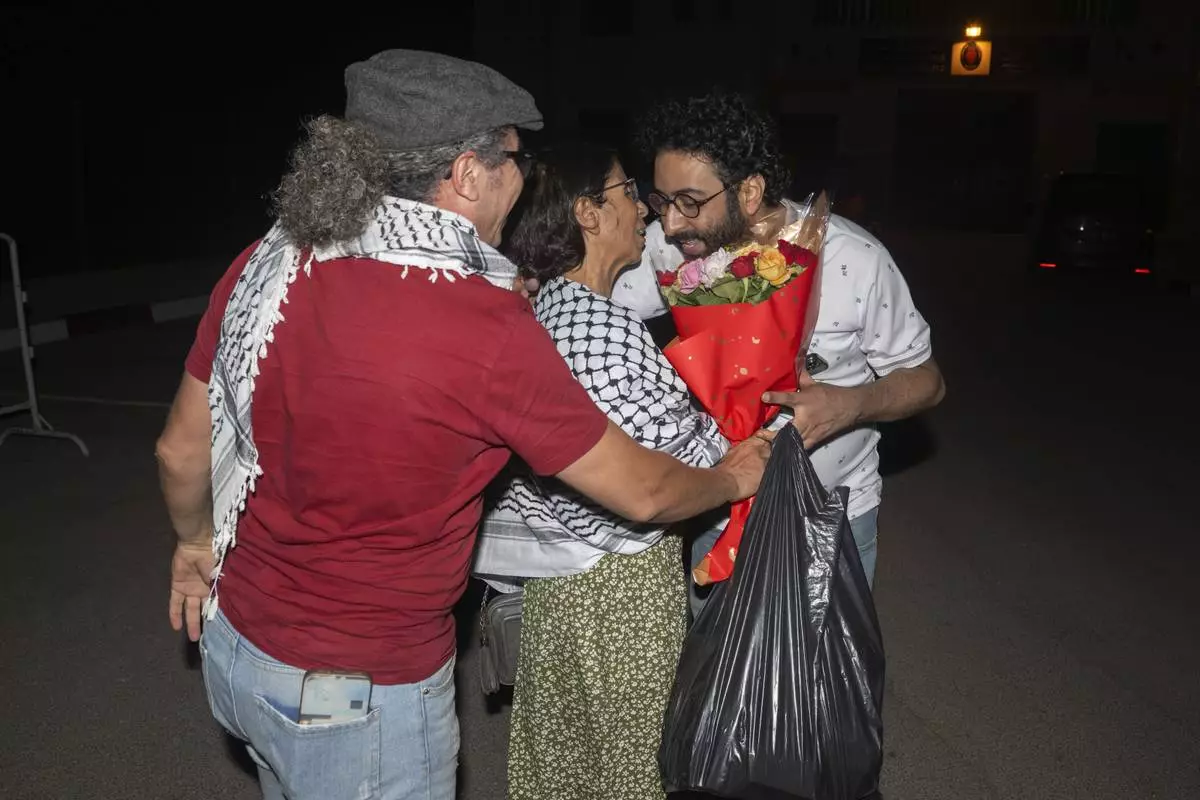
Omar Radi, a journalist and activist, right, is embraced by family members after he was released from prison in Tifelt, Morocco, Monday, July 29, 2024. Morocco's King Mohammed VI on Monday pardoned a group of journalists who were charged with sex crimes and espionage in prosecutions widely condemned by press freedom advocates as retaliatory in response to critical reporting. (AP Photo)
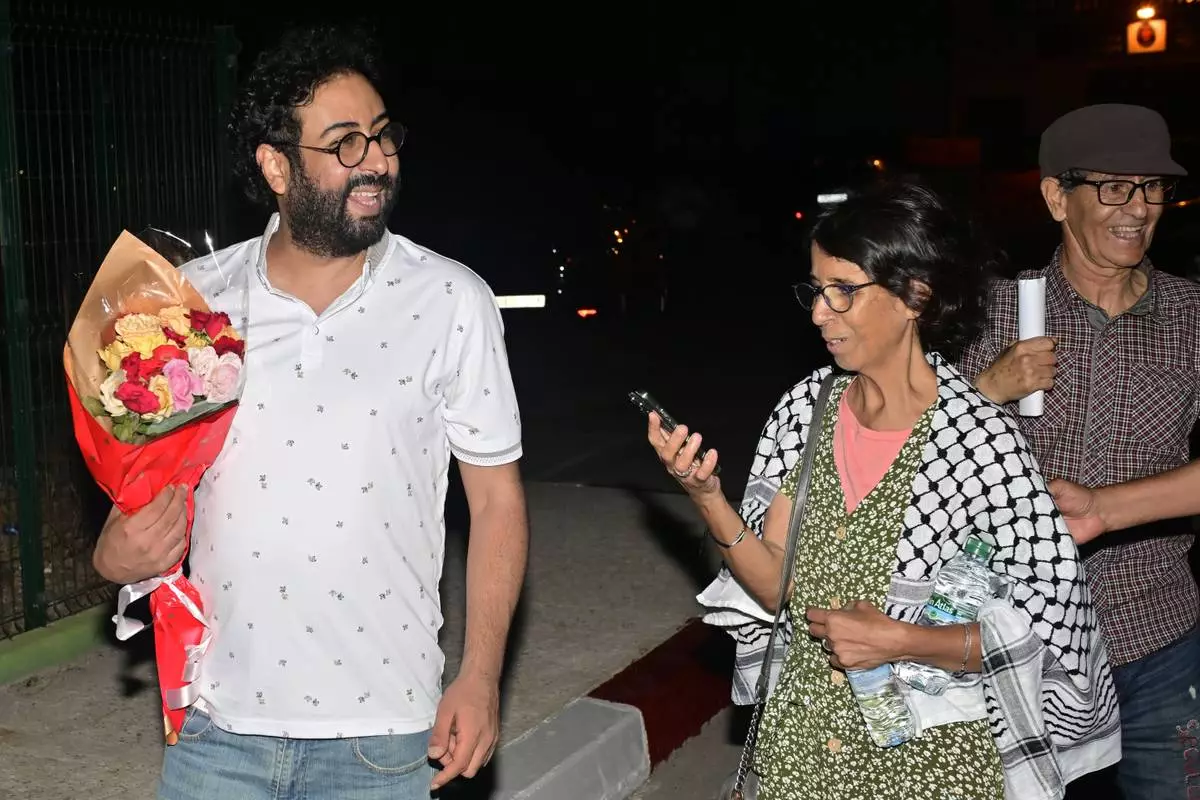
Omar Radi, a Journalist and an activist, left, with family members after he was pardoned and released from prison in Tifelt, Morocco, Monday, July. 29, 2024. Morocco's King Mohammed VI on Monday pardoned a group of journalists who were charged with sex crimes and espionage in prosecutions widely condemned by press freedom advocates as retaliatory in response to critical reporting. (AP Photo)

Omar Radi, a Journalist and activist is embraced by family member moment he was released from prison in Tifelt, Morocco, Monday, July. 29, 2024. Morocco's King Mohammed VI on Monday pardoned a group of journalists who were charged with sex crimes and espionage in prosecutions widely condemned by press freedom advocates as retaliatory in response to critical reporting. (AP Photo)
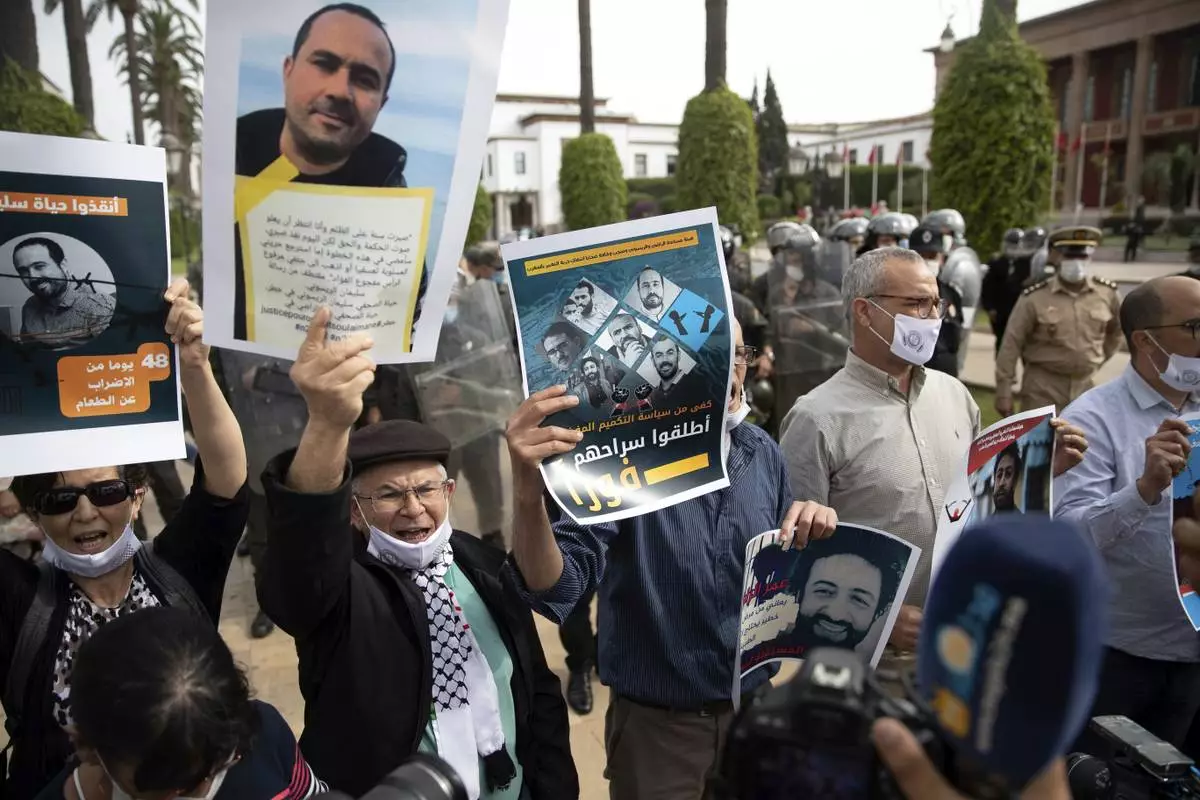
FILE - People carry banners and chant slogans during a protest calling for the release of detained journalists Omar Radi and Soulaimane Raissouni, in downtown Rabat, Morocco, Tuesday, May 25, 2021. Morocco’s King Mohammed VI on Monday, July 29, 2024, pardoned three journalists, including Radi and Raissouni, who were charged with sex crimes and espionage in prosecutions widely condemned by press freedom advocates as retaliatory in response to critical reporting. (AP Photo/Mosa'ab Elshamy, File)
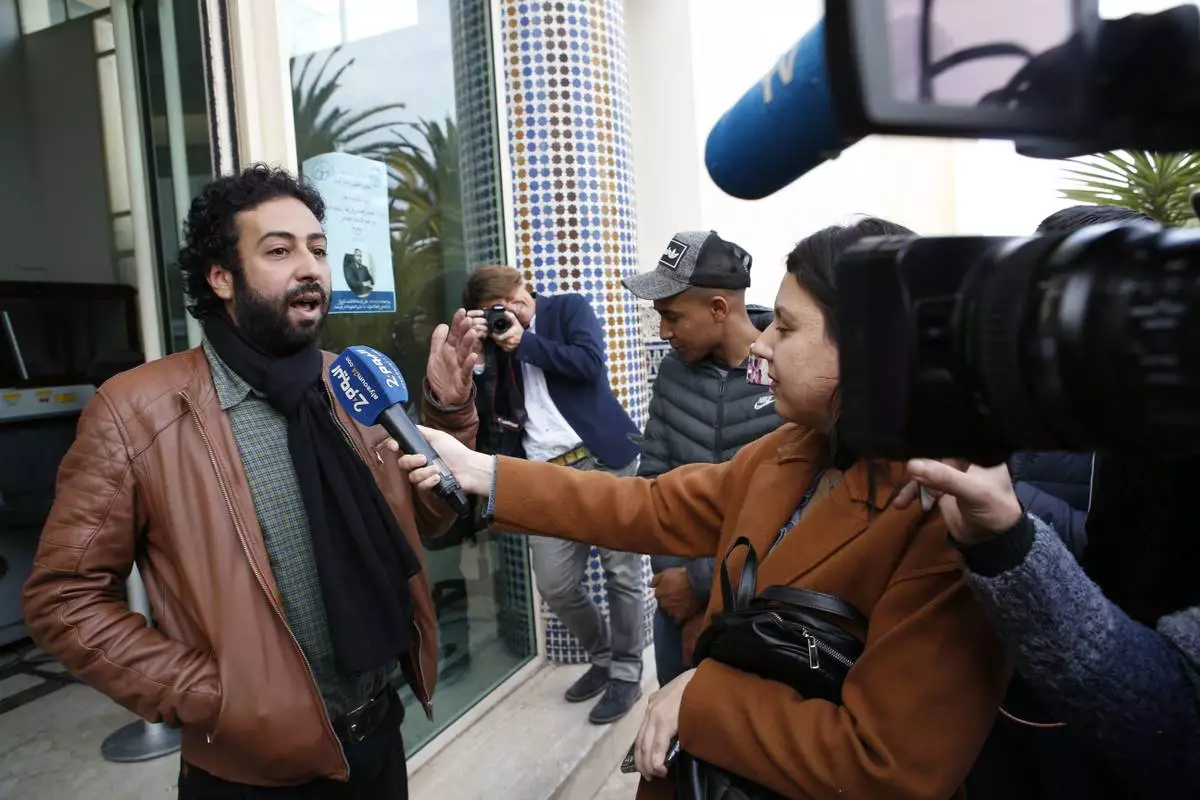
FILE - Journalist and activist Omar Radi speaks to the media after his hearing at the Casablanca Courthouse, In Casablanca, Morocco, Thursday March 5, 2020. Morocco’s King Mohammed VI on Monday, July 29, 2024, pardoned three journalists, including Radi, who were charged with sex crimes and espionage in prosecutions widely condemned by press freedom advocates as retaliatory in response to critical reporting. (AP Photo/Abdeljalil Bounhar, File)
On a scorching day in June 2013, the Grand Canyon discouraged hikers from making a long trek to the bottom because there would be no potable water. A set of historic cabins and bunks also would be closed overnight because of a water pipeline break.
The incident was one of more than 85 breaks that the 12.5-mile (20-kilometer) long Transcanyon Waterline, which supplies potable water to the Grand Canyon's South Rim and inner canyon, has experienced since 2010. Finished in 1970, the pipeline has long exceeded its 30-year design life, disrupting operations at one of the most popular U.S. national parks.
The pipeline has remained a leaky, flimsy albeit vital piece of infrastructure for millions of visitors. This year, after multiple breaks, officials imposed water restrictions and canceled overnight stays at busy hotels, upending some summer vacations over Labor Day weekend.
A long-term fix is expected by roughly 2027, but it's taken decades to get to that point. The lengthy timeline is due to a complex design process and the challenge of funding expensive projects at the National Park Service, which struggles under mountains of overdue maintenance, according to experts who know its history.
“It just takes awhile for something this big,” said Robert Parrish, chief of planning, environment and projects at Grand Canyon National Park, adding that it’s not just the park service — utilities can take 10 to 15 years to start building big projects.
Recent stays at El Tovar Hotel, Bright Angel Lodge and other hotels on the canyon's South Rim were halted for roughly a week as officials rushed to patch up four breaks in the water line.
The Transcanyon pipeline twists and turns over the canyon's rugged terrain. For years, the park service repaired pipeline failures from rock falls, freezes, flash floods and other causes on an ad hoc basis, Parrish said. One 2015 estimate said over roughly the previous three decades, the pipeline suffered five to 30 breaks per year. Those cost on average about $25,000 each.
It isn't like fixing most pipelines, according to Dan Cockrum, chief of maintenance and engineering at the park for nearly a decade until 1993.
Helicopters had to shuttle workers to the leak. They would measure the damaged pipe's thickness and bend, return to the rim and craft a replacement piece, then head back down to install the new section, he recalled.
Leaks happened a few times a year. Around when Cockrum left that job, engineers studied replacing the entire thing or its most vulnerable portions, because it was suffering stress fractures and corrosion and was near the end of its useful life. But the plan for a major fix wasn't adopted.
“When you have inadequate resources it comes down to sort of a triage approach," said Ernie Atencio, Southwest regional director with the National Parks Conservation Association and a former Grand Canyon ranger. "You do the best you can for as long as you can. And sometimes things will blow up on you.”
In the short term, a piecemeal approach may have made economic sense. A few repairs a year were significantly cheaper than the tens of millions of dollars for a replacement project, according to Greg MacGregor, chief of the project management team at the park from 2006 to 2017.
That thinking shifted toward a permanent solution in the early 2010s, Parrish said.
"Instead of looking at a large number of small repair projects, the teams really transitioned to ‘how do we look at making an overall replacement of the entire system?’” he said.
MacGregor remembers a huge brainstorm process to figure out the best option and years of analyzing how to solve the complex problem of moving scarce water up to the South Rim.
The park service has hurried to fix breaks, some bigger than others, and slowly save for a major overhaul, Parrish said, “There was too much to tackle at once."
In 2018, the National Park Service released an environmental assessment, asked for public input, then the next year officials signed off on a more comprehensive fix. The Transcanyon Waterline project will involve replacing about 3 miles (5 kilometers) of pipe inside the canyon, upgrading 3 miles (5 kilometers) of electrical supply line inside the canyon, building a water intake at a new location and updating water treatment and electrical systems.
Officials say the project will ensure the park will be able to meet its water supply needs for the next 50 years or more.
Funding was one of the biggest hurdles. The park’s maintenance backlog kept growing during MacGregor’s time, and he remembers Congress was reluctant to write a big check. The park would end up contributing from visitor fees. In 2018, fees went up in part to help pay for the pipeline.
U.S. national parks fund costly maintenance work mainly through Congress but also from donations, philanthropy and park entrance fees. Large parks like the Grand Canyon, with nearly 5 million visitors in 2023, don’t keep everything they receive from entrance fees; larger parks distribute a portion of fees to smaller parks, many of which don't charge visitors. Grand Canyon keeps 80% of its visitor fees, Parrish said.
A $208 million construction contract was awarded in 2023. Congress provided more than $70 million for the project but the bulk will come from park fees, Parrish said.
“The sheer magnitude of the scope of this project is maybe the answer to why it took so long to decide, plan and execute,” he said.
Over the years, breaks have taken a toll.
Wendy Haluda is a former baker at El Tovar Hotel where diners this spring could order a filet mignon with a demi glace for $54. After a pipeline break in 2016, water restrictions forced the restaurant to reduce dishwashing and use paper plates and plastic utensils. And Haluda recalled staff worrying about where they would go if conditions worsened to where they couldn't stay overnight at their park housing.
“It was scary,” she recalled.
Badly needed repairs, maintenance and infrastructure replacement like the Grand Canyon's pipeline are a nationwide problem. The park service has a nearly $23 billion maintenance backlog for aging infrastructure.
More than half that is for road work and maintaining buildings at national parks. The remainder is for water systems, trails, campground and infrastructure such as wastewater treatment.
The Grand Canyon has a backlog of $823 million for maintenance and repairs, mostly maintaining buildings and trails.
The Great American Outdoors Act of 2020 provided billions in additional funding, although it will expire soon if Congress doesn't renew it.
A lot of park infrastructure dates 70 years or more and upkeep has been neglected, according to Tate Watkins, a researcher at the think tank Property and Environment Research Center.
“People like cutting ribbons on new national parks,” he said. “But it’s a lot less sexy to talk about fixing sewer lines or, you know, rebuilding a water line for the Grand Canyon.”
Associated Press reporter Rio Yamat contributed from Las Vegas. Researcher Rhonda Shafner contributed from New York.
The Associated Press receives support from the Walton Family Foundation for coverage of water and environmental policy. The AP is solely responsible for all content. For all of AP’s environmental coverage, visit https://apnews.com/hub/climate-and-environment.
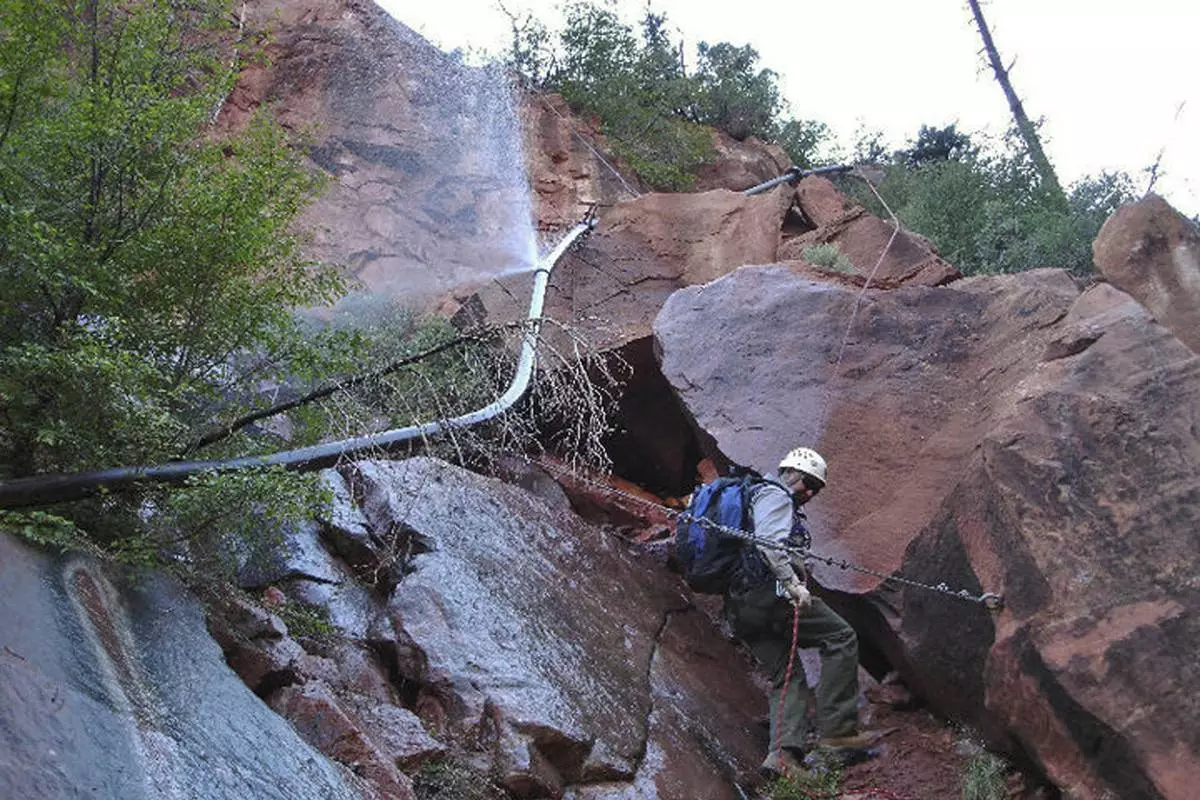
FILE - In this undated photo provided by the National Park Service shows a water spraying from a break in an exposed section of the Grand Canyon trans-canyon waterline as a worker attempts repairs. (National Park Service via AP, File)
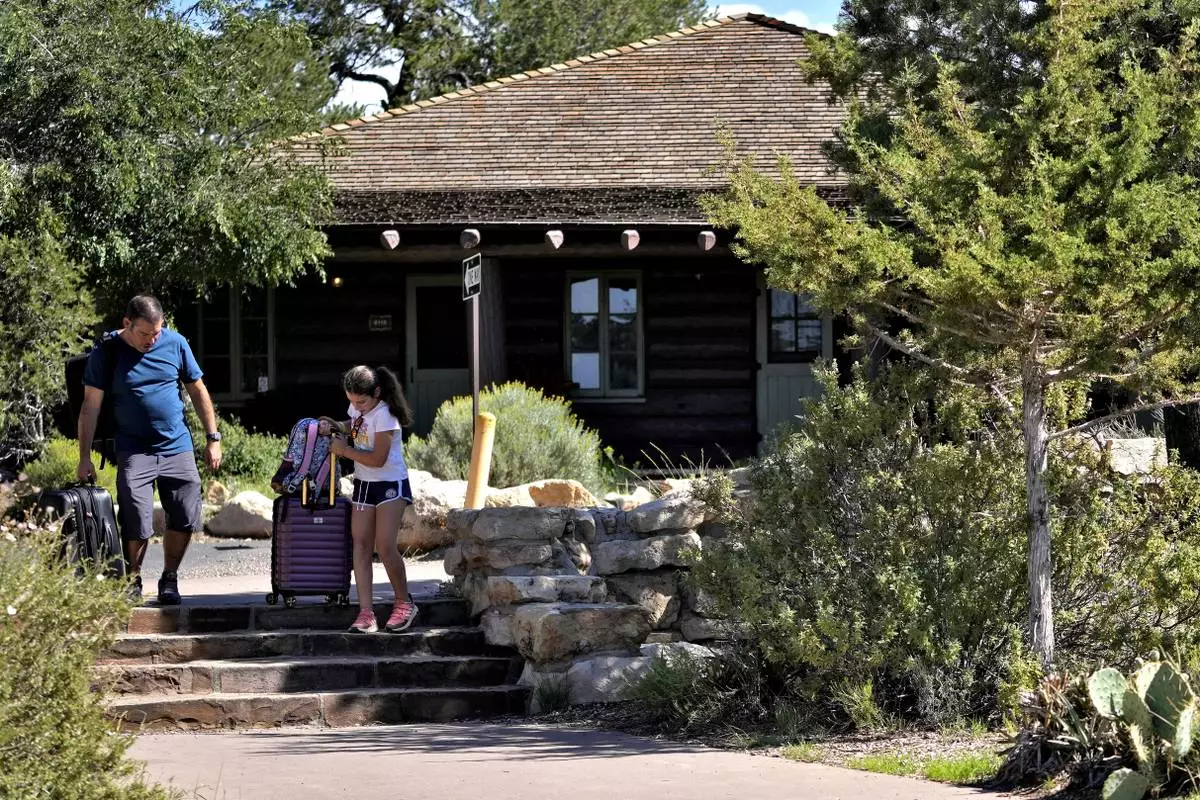
Guests exit Bright Angel Lodge, after visitors won't be able to stay overnight in hotels at Grand Canyon National Park beginning Thursday after a series of breaks in the only pipeline that serves the popular tourist destination, Thursday, Aug. 29, 2024, in Grand Canyon, Ariz. AP Photo/Matt York)
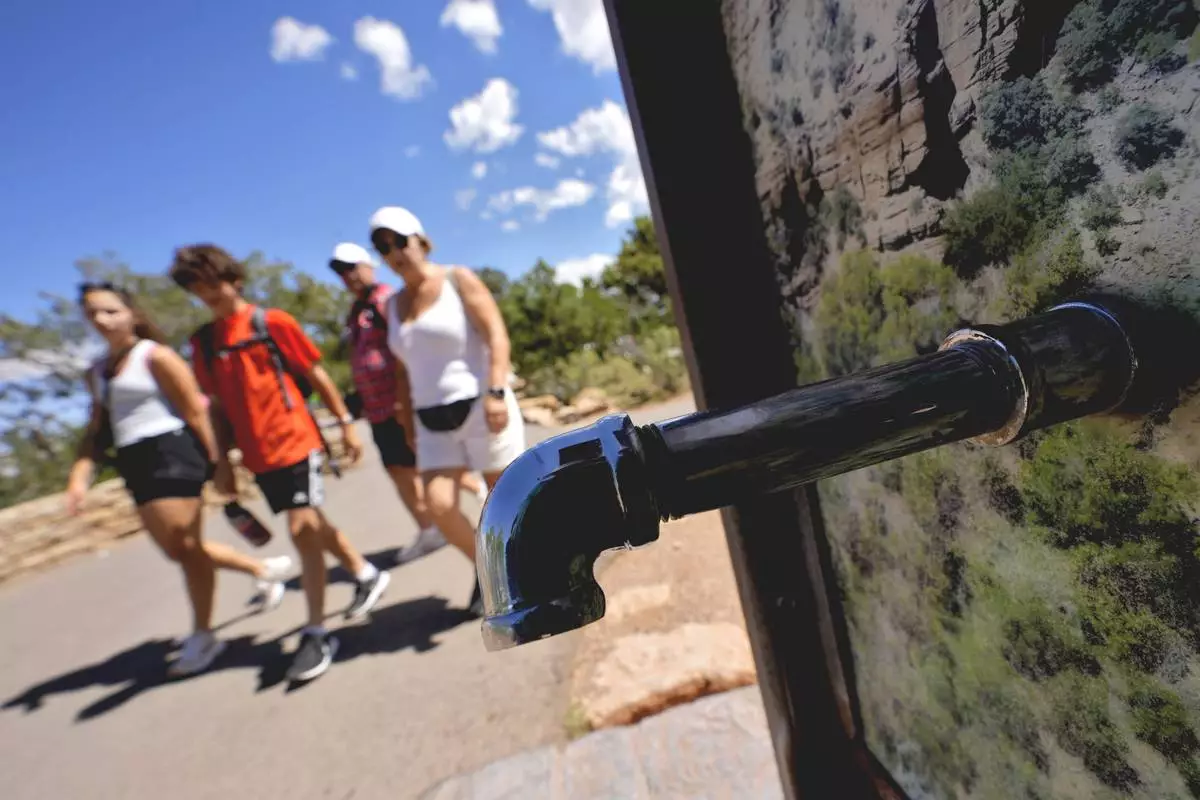
A group of day visitors walk past a closed water bottle tap along the Rim Trail, as visitors won't be able to stay overnight in hotels or refill water bottles at Grand Canyon National Park after a series of breaks in the only pipeline that serves the popular tourist destination, Thursday, Aug. 29, 2024, in Grand Canyon, Ariz. (AP Photo/Matt York)










